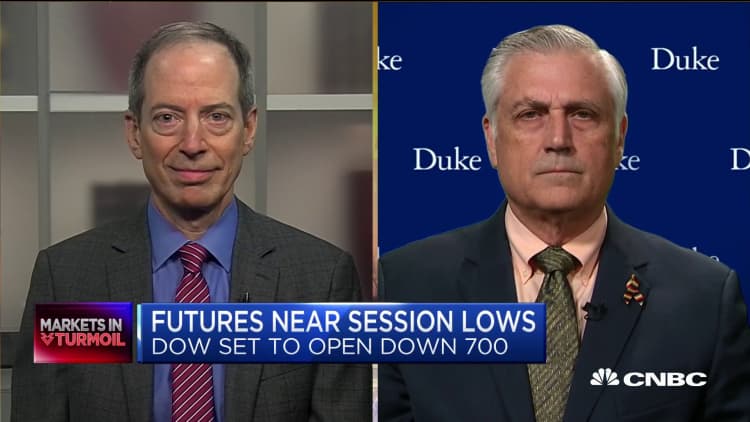The Trump Administration and Congress should come together to pass an immediate $1 trillion conditional emergency stimulus to combat the coronavirus.
Why $1 trillion? Because it's a number likely big enough to instill confidence in the public and in markets, showing government stands ready to put a floor under the economy. At 5% of a year's GDP it's several times greater than the worst possible losses estimated by the most pessimistic economists.
The money could be used to extend unemployment insurance benefits, provide a back-up to small business that could experience severe disruption from the virus and provide extra funds throughout the health care system, to pay for additional testing and hospital visits for the uninsured, overtime for health care workers and buttress overextended hospitals, especially in rural areas.

It could provide additional pay to workers who stay at home, either because they are quarantined or sick.
Some have also suggested payroll tax cuts to encourage employers to keep workers employed and put more money in people's pockets. And, yes, it could also be used to pay for badly needed infrastructure in this country.
Why should some of it be conditional? Because it's not entirely clear that such a large amount will be needed. The money would be available should the US economy experience widespread shutdowns, losses and bankruptcies.
My preference is always to allow the market and private sector to operate on its own, when it can. But the right way to think about this is the same way we view hurricanes or other natural disasters, except on a national scale: temporary assistance to help people get back on their feet. (For the record, I oppose some of the aid that encourages rebuilding in predictable and perennial flood zones, that is, aid that encourages moral hazard.)
The timing is right
But this is potentially different. There are good businesses that could go under due to this virus. There are workers who will lose work, either because they may be sick or stay at home to prevent others from being sick, workers who can't afford to lose those paychecks.
How do you pay for it? With the 10-year government bond yield at 0.7% and falling as I write, the cost to the government would be as cheap as it's ever been. In fact, all you have to do is ask whether the return on that money is greater than the interest rate, either in GDP that's not lost, or even added.
Work by former IMF Chief Economist Olivier Blanchard after the financial crisis showed that the economic effects of government spending (so-called multipliers) during downturns are likely larger than originally thought.
This could help Wall Street, but, in most cases, I would prohibit aid to the largest companies, especially those with the ability to access debt markets on their own. Business just got a huge tax break. They can use some of that windfall to see their way thru this crisis. Perhaps there could be a case for some assistance to airlines beyond what business disruption insurance they may have.
Another positive aspect of fiscal spending is that the Federal Reserve's recent half-point rate cut and future cuts may not be the right tool to address the economic effects of the virus. Fiscal spending would allow the Fed to hold onto what is has in positive interest rates for a possible worsening of the situation.
Reasonable people can argue about the amount, about how to target it in a way that helps the neediest and has the most efficient economic effects. But I believe there's a very good case to be made for a large government stimulus program that is at the ready for worst-case outcomes, that shifts the focus from monetary policy to fiscal policy and that takes advantage of historically low interest rates.



